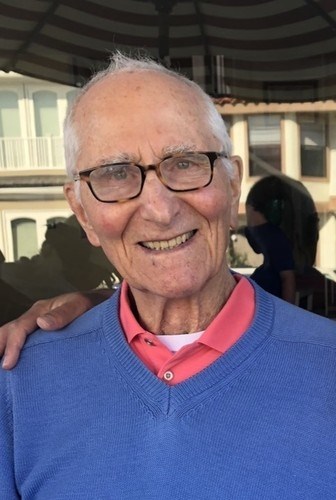|
.jpg) (3).jpg) Raymond L Solari Raymond L Solari
February 13, 1928 - March 17, 2023
Coach Solari's career with SPHS began in 1954 through 1972; serving as Boys' Physical Education Athletic Coach including Varsity Head Football Coach, Varsity Head Baseball Coach, Director of Athletics, and Safety and Driver Education.
*******************************************
 Raymond Solari passed away peacefully on March 17, 2023. His great heart finally gave out just before midnight, and he's gone on to his next Big Game. Born February 13, 1928 in San Francisco, he was the son of Antonio and Vittoria Solari, immigrants from northern Italy. Raymond Solari passed away peacefully on March 17, 2023. His great heart finally gave out just before midnight, and he's gone on to his next Big Game. Born February 13, 1928 in San Francisco, he was the son of Antonio and Vittoria Solari, immigrants from northern Italy.
From earliest childhood, his dream was to play football at Cal and beat Stanford, a goal he accomplished in robust fashion. After graduation from Galileo High School, he went on to play guard and linebacker at Cal under the legendary Pappy Waldorf; the team played in three Rose Bowls. He was drafted by the Cleveland Browns and traded to the San Francisco 49ers whose doctors advised that he not play because of a back injury. He returned to Cal and earned a teaching credential, serving as a graduate coaching assistant under Pappy Waldorf. In 1952 he was drafted into the US Army and sent to Korea, where he organized recreational programs, taught English grammar to NCOs, and ran the library.
In 1954, he accepted a teaching and coaching position at South Pasadena High School, where he eventually led the Tigers to five Rio Hondo League championships, four CIF championships, and a perfect season in 1969. In 1972, he returned to Northern California to coach the Menlo College Oaks, overseeing the team's transition from a junior college program into an NCAA division III program in 1986. In 1999, SPHS named him Coach of the Century and named its football stadium after him, a measure of the degree to which he influenced the lives of young men. His unique coaching style combined strict discipline, quirky humor, and compassion. He was much loved.
In retirement, he and his wife Constance traveled frequently to Italy and Kauai. They were long-time subscribers to the San Francisco Symphony, and for over 40 years they hosted literary and artistic salons in their Menlo Park home. He was also founder and head of the Zot Party, a group of friends from across the political spectrum who gathered quarterly to discuss politics-luncheons informed by spirited debate and civility.
Above all things, Raymond was a man devoted to his family-a loving husband and dedicated father whose most recent years were brightened by the presence of four glorious grandchildren.
He is survived by his wife of 50 years, Constance Hines Solari (SPHS '66); his children, Robin Solari, Antonia Solari Moran (Robert), and Christopher Solari (Jennifer); and four grandchildren, Arthur, Harrison, and Aiden Moran, and Violet Solari.
San Francisco Chronicle, March 21, 2023
|
Charles Timothy 'Tim' James (1977)
A legend, what more can be said? One of "Pappy's Boys" at Cal during their Rose Bowl years 1949-50, to 3-time CIF wiining coach at SPHS. Go Bears and Go Tigers...condolences to his family and to his players.
David Alan Sato (1971)
I remember Ray Solari giving his athletes a military rank. When you started, you were a private. Those who excelled became officers and if you were a superstar you were a general. I think he even did it for kids in his gym classes. Like everyone else, he referred to me as “Private Sato”. Although I played a lot of sports, at 5’5” and 120 lbs, I wasn’t Varsity Football material.
One day, while training after school, Solari and a few other coaches were leaning against the rail behind the gym. I think I was running on the track. I don’t remember why, but he called out to me as “Colonel Sato”. I was completely surprised but I guess he recognized my efforts. It did teach me the value of working hard and that extra effort was recognized, if only by the reward of a meaningless rank. It also taught me the value of recognizing other’s efforts. Giving a rank was Coach Solari’s way of rewarding his athletes and motivating them to give extra effort. This was one of the reasons why he was so successful.
James Tomlin (1961)
Scott Farrow (1970)
Yes Sir! And God Speed.
Scott Farow (1969 football) and on behalf of Don Farrow (1964 football; 1965 baseball)
William W Cleary (1970)
The Magic of Coach Ray Solari
Coach Solari's magic was his ability to turn average, small town teenage boys who loved to throw the football around, into State champions. In fact, Coach Solari earned five SPHS league championships.
It was never about the individual or the star players; it was always about working together as a team. Coach Solari had a memorable style that combined discipline with humor to instill responsibility amongst all the players. Many lessons learned continued beyond the field. In turn, respect for Coach Solari was unchallenged.
Coach Solari's legacy lives through all of us who had the privilege of knowing him.
Loren Scott Shumer (1965)